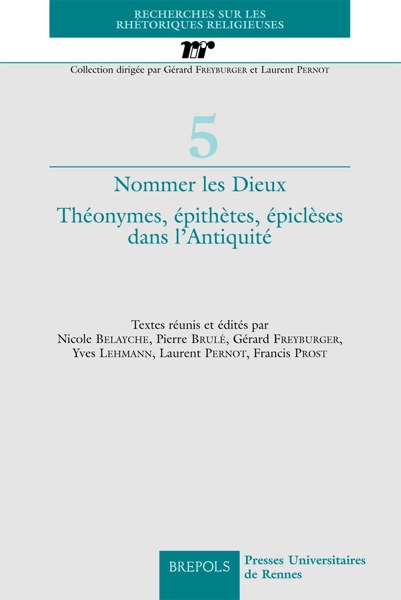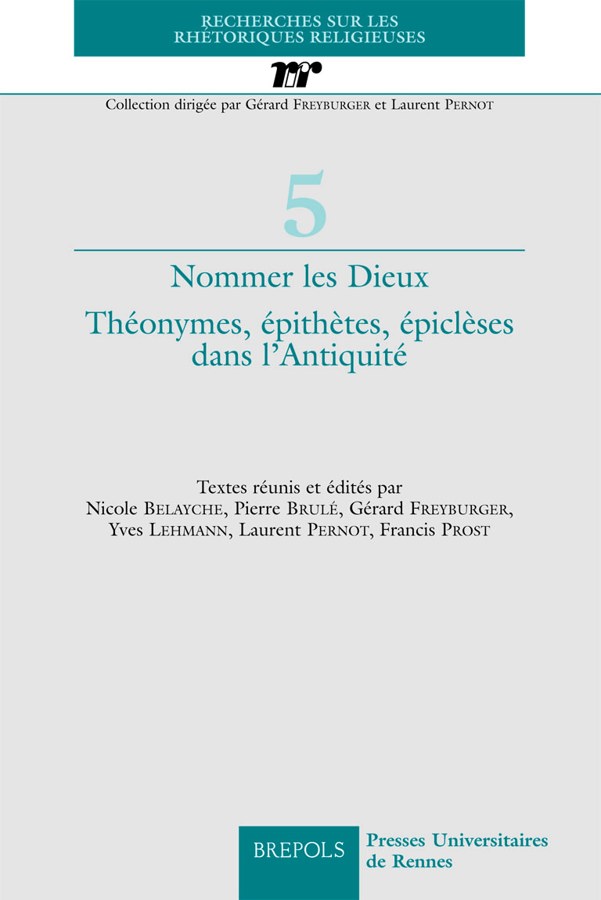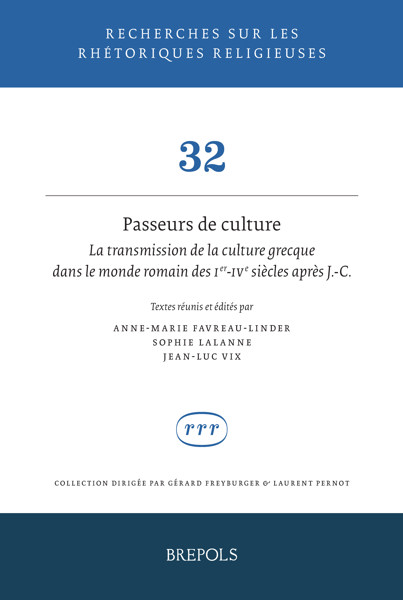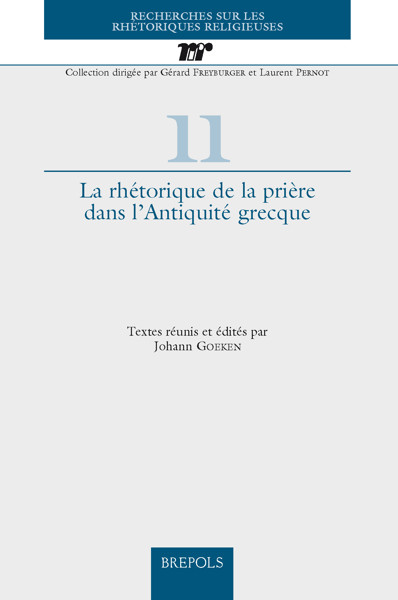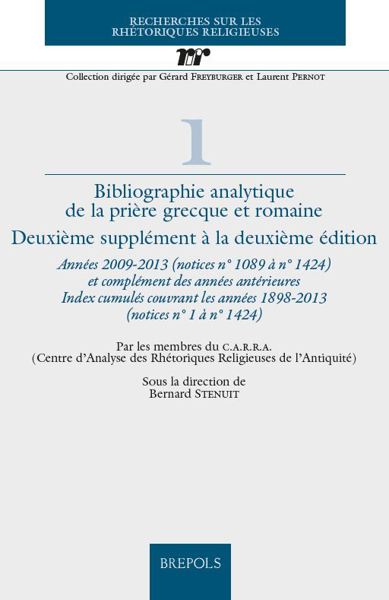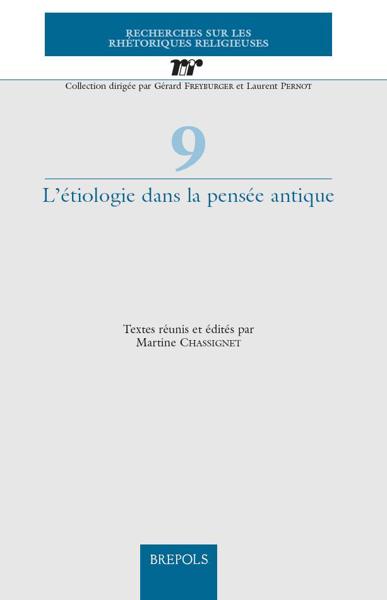
Nommer les dieux
Théonymes, épithètes, épiclèses dans l'Antiquité
N. Belayche, P. Brulé, G. Freyburger, Y. Lehmann, L. Pernot, F. Prost (eds)
- Pages: 665 p.
- Size:155 x 240 mm
- Language(s):French, Italian
- Publication Year:2006
- € 65,00 EXCL. VAT RETAIL PRICE
- ISBN: 978-2-503-51686-8
- Paperback
- Available
- € 65,00 EXCL. VAT RETAIL PRICE
- ISBN: 978-2-503-54631-5
- E-book
- Available
Advances in the modern interpretation of myth and in the history of ancient religion in general have radically modified our ways of studying the names and the naming of the gods. Two avenues of research notably are current today : the relationship between the narration of the myth and the name (all « speaking » names tell a story) and the necessity for the faithful to identify, to distinguish and to name the divine, in polytheisms naturally, but also in monotheisms. Can the name of a god be only a label? Calling (for help), singing (in praise), invoking (with others), calling to witness (as a guarantee), all involve this important act of identification, a recognition, in the heart of a process which seems more complex than it appeared to be at first glance.
The fact that this identification is made in common (and in community) draws attention to another methodological requirement. Beyond the signified « divine entity » lie the language act and its context, which are part of the naming : this means that its linguistic and social aspects must be taken into consideration.
At issue then is studying the thousand ways in which the gods are designated in the religions of Antiquity : names, qualifiers, theonyms, hieronyms, epithets, epicleses. The cataloguing and the exegesis of the divine appellations are accompanied by a consideration of the notion itself of « divine name » from an avowedly multidisciplinary point of view.
While the majority of the contributions deal with Greek and Roman religion, as many pages as possible have been left, in the interest of a comparatist point of view, for Egyptian religion (under the pharaohs and the Ptolemies), Oscan-speakers, Judaism and Christianism. The documents studied include texts, literary and other, in prose and in poetry, papyri, inscriptions, vascular graffiti.
Thanks to the discovery of unpublished material, to the progress of our studies and their objects, to the consideration of document types, regions and periods which had not been sufficiently taken into account, new light is thrown upon the question of divine names. Through the meeting of rhetoric and religion the present book thus opens new perspectives.
The result of two colloquia organised by the Universities of Rennes and of Strasbourg, with the participation of the University of Naples, Naming the Gods is a book which has been carefully constructed and thought out through time. It is a richly illustrated summa which unites the contributions of many French and European colleagues, confirmed scholars for the most part, but also younger researchers who form the hope of our disciplines ; it promises to be a landmark.
Les avancées de la critique moderne sur le mythe et sur l’histoire des religions antiques en général ont radicalement modifié notre manière d’examiner le nom et la nomination des dieux. Deux axes surtout se dégagent aujourd’hui : la question du rapport entre le récit mythique et le nom (tout nom « parlant » raconte) et la nécessité pour les fidèles d’identifier le divin, de le discriminer, de le nommer, ceci surtout dans le polythéisme, mais aussi dans les monothéismes. Le nom d’un dieu peut-il n’être qu’une étiquette ? Appeler (au secours), chanter (pour louer), citer (en compagnie des autres), prendre à témoin (comme garantie), tout cela suppose ce fameux acte d’identification, une reconnaissance, au sein d’un processus plus complexe qu’il n’y paraît d’emblée.
Le fait que cette identification soit commune (et communautaire) attire l’attention sur une autre exigence méthodologique, qui veut qu’au-delà du signifié « entité divine », on n’oublie pas l’acte de langage et son contexte inclus dans l’usage du nom, ce qui revient à s’intéresser à sa dimension linguistique et sociale.
Il s’agit donc d’examiner les mille façons dont les dieux sont désignés dans les religions de l’Antiquité : noms, qualificatifs, théonymes, hiéronymes, épithètes, épiclèses. Le relevé et l’exégèse des appellations divines s’acompagnent d’une réflexion sur la notion même de nom divin, dans un esprit résolument pluridisciplinaire.
Si les contributions portent majoritairement sur les religions grecque et romaine, une place aussi importante que possible a été ménagée, dans un esprit comparatiste, à la religion égyptienne, pharaonique et ptolémaïque, au monde oscophone, au judaïsme et au christianisme. Les documents étudiés comprennent des textes, littéraires et autres, en prose et en vers, des papyri, des inscriptions, des graffiti vasculaires
Grâce à la découverte de sources inédites, grâce aux progrès des disciplines et des problématiques, grâce à l’attention portée à des catégories de documents, à des aires géographiques et à des périodes chronologiques qui n’avaient pas été suffisamment considérées, il est possible d’apporter du nouveau sur la question des noms divins. A la croisée du fait rhétorique et du fait religieux, le présent ouvrage trace de nouvelles directions.
Issu de deux colloques organisés par les Universités de Rennes et de Strasbourg, avec la participation de l’Université de Naples, Nommer les Dieux est un livre entièrement construit et repensé, fruit d’un long processus – une somme, richement illustrée, qui regroupe les travaux de nombreux collègues français et européens, savants confirmés pour la plupart, et aussi jeunes espoirs de la recherche, et qui est appelée à faire référence.
